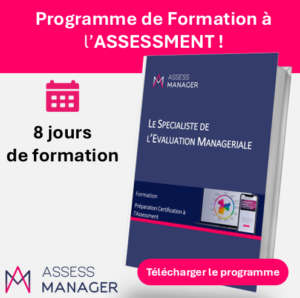Assess Manager is a management test used by management professionals and recruiters, and meets the scientific standards of the American Psychological Association (APA) and the International Test Comission (ITC).

How can I be sure that a psychometric test is reliable?
Assess Manager meets the scientific standards of the American Psychological Association and the International Test Comission.
To do this, the management test we offer meets 3 recognised psychometric criteria which guarantee real quality:
- fidelity
- sensitivity
- and validity
More details below. The empirical approach of taking the test yourself will be a second step
The book “le management à porter demain” accompanies the management test by providing theoretical references and concrete examples directly related to all the skills assessed in the test.
The loyalty of the Assess Manager management test
- You can take the management test again and again, and you’ll get the same results. This is the loyalty of the management test.
- On the other hand, if you receive management training or coaching, you will evolve. The results after this support will be different. You’ll be able to measure the changes and skills you’ve acquired
Loyalty is demonstrated in 2 ways. Without learning, your results are identical. After learning, they change and reflect your own development.
In this respect, a major study carried out in 2020 on over 8,000 people bears witness to the scientific validity of the Assess Manager management test by revealing the differences in skills between managers and changes in personality depending on the level of managerial skills used by the populations studied.
The sensitivity of the Assess Manager management test
Sensitivity makes it possible to differentiate between the results of two people in order to facilitate an accurate assessment.
Sensitivity is important in the context of assessments, as it enables a fine distinction to be made between the skills of two managers, and also enables an assessment to be made of managers’ needs for support according to their skills and potential shortcomings or areas for improvement.
There are two types of sensitivity: inter-individual sensitivity, explained above, to differentiate between the potential or actual managerial qualities of two individuals.
Intra-individual sensitivity, on the other hand, can be used to gauge the progress made between taking the psycho-technical test and measuring progress following management training or coaching.
The validity of the Assess Manager management test
Internal validity allows us to validate that the psychometric test does indeed measure the management skills we are looking for and that it is faithful to the underlying management theories. The test has been developed using the major management theories as a reference, while incorporating a detailed analysis of the associated personality qualities required.
Internal validity covers several sub-categories: construct validity, content validity and face validity.
The context set by the test in its questions must not have a deviating effect on the initial objective. This validity is based on the subjective judgement of experts who consider, after comparison (objectification), that the items in the instrument do indeed correspond to the initial postulate. When you take the test, you will notice that none of the questions asks for the best answer a priori, which allows the respondent to give answers that are similar to his or her own, rather than the expected answers.

External validity is the second major component that validates the scientific criterion of the psychometric test in the ‘validity’ category described here.
External validity is based on the use of an accurate predictive criterion.
The results of the scientific analysis carried out on more than 8,000 people tested reinforce external validity, in particular via 2 aspects (which are not exhaustive). On the one hand, executives with extensive managerial experience have the best management results. On the other hand, part of the population of managers has poor results because not everyone is progressing.
It must also avoid the following biases:
- The social desirability bias consists in responding to a so-called expected answer. The responses to the assess-manager test are positively oriented in order to counterbalance this effect.
- Influence bias refers to the effects of the questioning method and the way the results are processed. The Assess Manager test avoids this bias thanks to 5 elements:
- The test is taken online and the questions are standardised
- The computer is the one asking the questions, which is a total guarantee of neutrality
- The questions are presented in a random order, so that no logical questioning pattern can be detected
- The questionnaire is timed, so that the degree of spontaneity in the answers can be measured
- The processing of responses is digitised and therefore unaffected by biases of interpretation or affect.
- The acquiescence bias is the tendency of the person to answer “yes” rather than “no”, which does not exist in this test since no question is formulated in this sense.
- Central tendency bias (or indecision bias) exists when people have the option of answering with a neutral response (5 on a scale of 1 to 10, for example), which is never possible in the Assess Manager management test, which proposes checking responses multiple times rather than proposing neutrality, which biases responses.
- Ignorance bias refers to a person’s self-assessment directly on their qualities, a fairly common occurrence in many tests, including the 360° test. This bias is completely avoided in the Assess Manager psychometric test, since 92% of the questionnaire is based on responses to situations rather than self-assessments.
- The tendency to answer random ly is an uncontrollable bias, except through observation of the time taken to complete the test, which gives an interesting initial indication. Beyond that, this bias can only be measured, for all the tests, through an interview with a management skills assessment professional. The stopwatch built into the Assess Manager management questionnaire is a first reliable indicator
Key points about the scientific validity
Over and above the classic psychometric qualities, we paid particular attention over a period of 2 years to having the test taken by managers and carrying out in-depth test debriefs in order to validate that the results reflect the managerial qualities of the people tested.
In this way, the test can also identify the progress made by a person who has undergone training or coaching to improve their managerial qualities.
Finally, the scientific analysis of the results of 8,000 tests, to be carried out in 2022, will enhance the scientific validity of the post-tests and reinforce the quality of the management tests offered here.

To go further with Assess Manager


